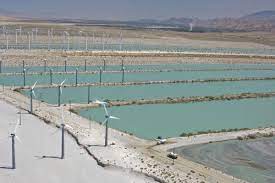
- Details
- By Native News Online Staff
The Agua Caliente Band of Cahuilla Indians, Coachella Valley Water District (CVWD), and Desert Water Agency (DWA) have reached a landmark agreement resolving two long-standing water rights lawsuits. The settlement marks a significant step toward long-term water management stability and increased reliability for residents across the Coachella Valley.
“The agreement affirms the Tribe’s right to manage, regulate, and govern the use of the Tribal Water Right in the Coachella Valley, and at the same time will provide a real benefit to the entire Coachella Valley,” Tribal Chairman Reid D. Milanovich said. “We all rolled up our sleeves and worked together to come to an agreement that recognizes the Tribe’s water rights and sovereignty, considers the unique jurisdictional issues of our checkerboard reservation, and respects our traditional and cultural uses for our tribal community. It also ensures that Coachella Valley residents from now and into the distant future can be assured that the water management of this basin is done jointly with a continued focus on water sustainability and reliability for all.
Chairman Milanovich also expressed appreciation for the longstanding support from Riverside County Fourth District Supervisor V. Manuel Perez, adding, “We look forward to working together to implement this historic settlement.”
Desert Water Agency Board President Paul Ortega emphasized that the agreement will not impact water services for customers:
“Our customers can be confident this settlement will not affect our ability to deliver safe, reliable water. It honors the Tribe’s sovereign right to manage water resources while reinforcing our shared commitment to protecting and sustaining our aquifer.”
Coachella Valley Water District Board President John Powell Jr. echoed the significance of the agreement:
“This settlement recognizes Tribal Water Rights and establishes a framework for lasting collaboration on local water management. CVWD has served the Coachella Valley for over a century with a focus on responsible groundwater stewardship and a diversified water portfolio. This agreement positions us to continue that legacy well into the future.”
Next, the Tribe, CVWD, and DWA will jointly seek federal legislation to approve the settlement and authorize up to $500 million in funding for water sustainability projects in the Indio Subbasin. The proposed federal investment would support a range of initiatives, including infrastructure upgrades, groundwater replenishment, and enhanced water management across both the Indio Subbasin and the Agua Caliente Indian Reservation.
This landmark agreement marks a new chapter in regional water management, grounded in respect, partnership, and shared stewardship of one of the Coachella Valley’s most vital resources.
More Stories Like This
Navajo Resources and Development Committee Issues Notice on Livestock Inspection RequirementsAmerican Prairie, Tribal Coalition Files Protest Over Rescinded Grazing Rights
Northern Cheyenne Push Back Against Trump Administration’s Effort to Alter Little Bighorn History
Florida Man Sentenced for Falsely Selling Imported Jewelry as Pueblo Indian–Made
Navajo Nation Declares State Of Emergency As Winter Storm Threatens Region
Help us defend tribal sovereignty.
At Native News Online, our mission is rooted in telling the stories that strengthen sovereignty and uplift Indigenous voices — not just at year’s end, but every single day.
Because of your generosity last year, we were able to keep our reporters on the ground in tribal communities, at national gatherings and in the halls of Congress — covering the issues that matter most to Indian Country: sovereignty, culture, education, health and economic opportunity.
That support sustained us through a tough year in 2025. Now, as we look to the year ahead, we need your help right now to ensure warrior journalism remains strong — reporting that defends tribal sovereignty, amplifies Native truth, and holds power accountable.
 The stakes couldn't be higher. Your support keeps Native voices heard, Native stories told and Native sovereignty defended.
The stakes couldn't be higher. Your support keeps Native voices heard, Native stories told and Native sovereignty defended.
Stand with Warrior Journalism today.
Levi Rickert (Potawatomi), Editor & Publisher


